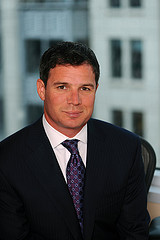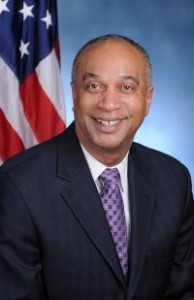To describe the new-look American Gaming Association as “activist” would be an understatement of some magnitude. President Geoff Freeman has put the pedal to the metal in his quest for legalized sports betting. Today, Freeman mounted his bully pulpit in  order to point out the $88 billion dollars would be wagered illegally on the NFL this season. That’s a lot of revenue that the federal government is allowing to escape, especially when so many states and cities could benefit from legalized, regulated sports betting. In addition to being able to cite popular support for his position, Freeman is able to point to allies in the public sector who share his views. If you scroll way, waaaaaaaayyy down the minutes of the last United States Conference of Mayors, you find that the Hizzoners of America resolved that “current law is out of step with public attitudes … legal, regulated, and taxed sports wagering will provide potential funds for community development projects, jobs, and revenue for cities … [we] believe it’s time for a new approach to sports betting in the United States that could include strict regulation, rigorous consumer protections, taxation of revenues to benefit local communities, and robust tools and resources for law enforcement to root out illegal sports betting and uphold the integrity of games.”
order to point out the $88 billion dollars would be wagered illegally on the NFL this season. That’s a lot of revenue that the federal government is allowing to escape, especially when so many states and cities could benefit from legalized, regulated sports betting. In addition to being able to cite popular support for his position, Freeman is able to point to allies in the public sector who share his views. If you scroll way, waaaaaaaayyy down the minutes of the last United States Conference of Mayors, you find that the Hizzoners of America resolved that “current law is out of step with public attitudes … legal, regulated, and taxed sports wagering will provide potential funds for community development projects, jobs, and revenue for cities … [we] believe it’s time for a new approach to sports betting in the United States that could include strict regulation, rigorous consumer protections, taxation of revenues to benefit local communities, and robust tools and resources for law enforcement to root out illegal sports betting and uphold the integrity of games.”
Similarly, if you rummage through the resolutions of the National Conference of State Legislatures, you will find one demanding that the federal government butt out of gambling-related issues. This was in reference to Internet gambling, daily fantasy sports — and sports betting. “The federal ban instituted under the PASPA has not prevented the conduct of illegal sports gambling, but has in  effect restricted the ability of all but a few states to regulate and collect revenue from sport gambling wagers estimated to be in the billions of dollars each year, to the detriment of state economies,” said the convention of solons. The Legislature in Pennsylvania has even considered a bill calling for repeal of the Bradley Act, cumbersomely known PASPA. New York State Assemblyman Gary Pretlow (D), the Empire State’s point man on gaming issues, wants to legalize sports betting, too. “The American appetite for sports betting has never been greater,” says Freeman. “As law enforcement’s deep concern with the thriving illegal gambling market demonstrates, it is time to address this problem and bring sports betting out of the shadows.” We agree.
effect restricted the ability of all but a few states to regulate and collect revenue from sport gambling wagers estimated to be in the billions of dollars each year, to the detriment of state economies,” said the convention of solons. The Legislature in Pennsylvania has even considered a bill calling for repeal of the Bradley Act, cumbersomely known PASPA. New York State Assemblyman Gary Pretlow (D), the Empire State’s point man on gaming issues, wants to legalize sports betting, too. “The American appetite for sports betting has never been greater,” says Freeman. “As law enforcement’s deep concern with the thriving illegal gambling market demonstrates, it is time to address this problem and bring sports betting out of the shadows.” We agree.
* The house sure was lucky in Ohio last month. Table wagers fell 8% but table revenue rose 8.5% all the same. Slot revenue at Hollywood Columbus was up 7%, although play tailed off sharply from July, down to $163/slot/day. Hollywood Toledo was not so fortunate, dropping 10%, despite robust play of $193/slot/day. Penn National Gaming performed the strongest at its outlying racinos, with Hollywood Dayton producing $237/slot/day and overachiever Hollywood Austintown pulling in $274/slot/day. (The desired industry average is $200/slot/day.)
The new “Jack” brand isn’t doing jack for Dan Gilbert‘s casinos but Thistledown Racino (left) is redeeming itself, up 5% last month. Jack Cleveland slipped 2% last month, putting it just  a hair behind Hollywood Columbus ($17 million) in gross gaming revenue. Jack Cincinnati had a particularly bad month, plummeting 15.5%. Easily outpacing everyone, with almost $20 million in revenue, was Hard Rock Rocksino. It is impossible to overemphasize how impressive this feat is, because Hard Rock has no table games. Not one. At the other end of the spectrum, last-place finisher ($6 million) Belterra Park seems to have peaked, up 2% year/year. One does not need the benefit of hindsight to know that Pinnacle Entertainment made a mistake by going into competition with its Indiana casino, a relatively short drive away. Finally, Eldorado Resorts‘ Scioto Downs was up 3%, to close out the month with $13 million in the till.
a hair behind Hollywood Columbus ($17 million) in gross gaming revenue. Jack Cincinnati had a particularly bad month, plummeting 15.5%. Easily outpacing everyone, with almost $20 million in revenue, was Hard Rock Rocksino. It is impossible to overemphasize how impressive this feat is, because Hard Rock has no table games. Not one. At the other end of the spectrum, last-place finisher ($6 million) Belterra Park seems to have peaked, up 2% year/year. One does not need the benefit of hindsight to know that Pinnacle Entertainment made a mistake by going into competition with its Indiana casino, a relatively short drive away. Finally, Eldorado Resorts‘ Scioto Downs was up 3%, to close out the month with $13 million in the till.
* Pending regulatory approval, Z Capital Partners‘ takeover of Affinity Gaming is a done deal. Sixty-nine percent of shareholders voted to approve the $580 million deal, which gives Z Capital 11 casinos in Nevada, Colorado, Missouri and Iowa. Affinity spokesman Joseph Jaffoni promised that it would be business as usual and there would be no change in management. We hope not but Z Capital made some ominous noises at the time of its buyout offer, suggesting it would be anything other than a passive landlord.


The Jack brand is terrible. They are nice casinos, but have to wonder how they are now doing without Total Rewards customers.
No more parking vouchers or entry level card holders. & more play for the “A” & “C” cards.
The buffet really went down hill. Food not being replaced. Crap all over the floor. But they cut the price.
TRewards took back most of the uniforms too. dealers wearing t-shirts now. Cheaping out bigtime.